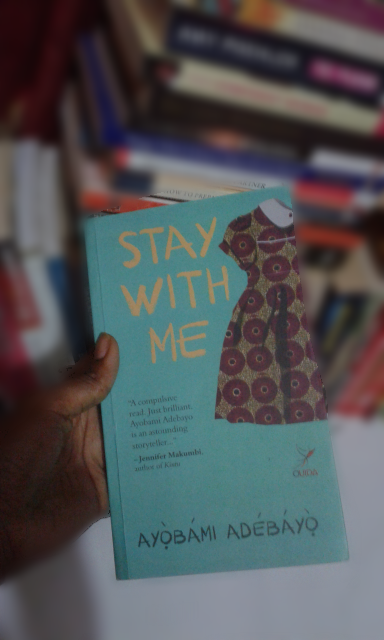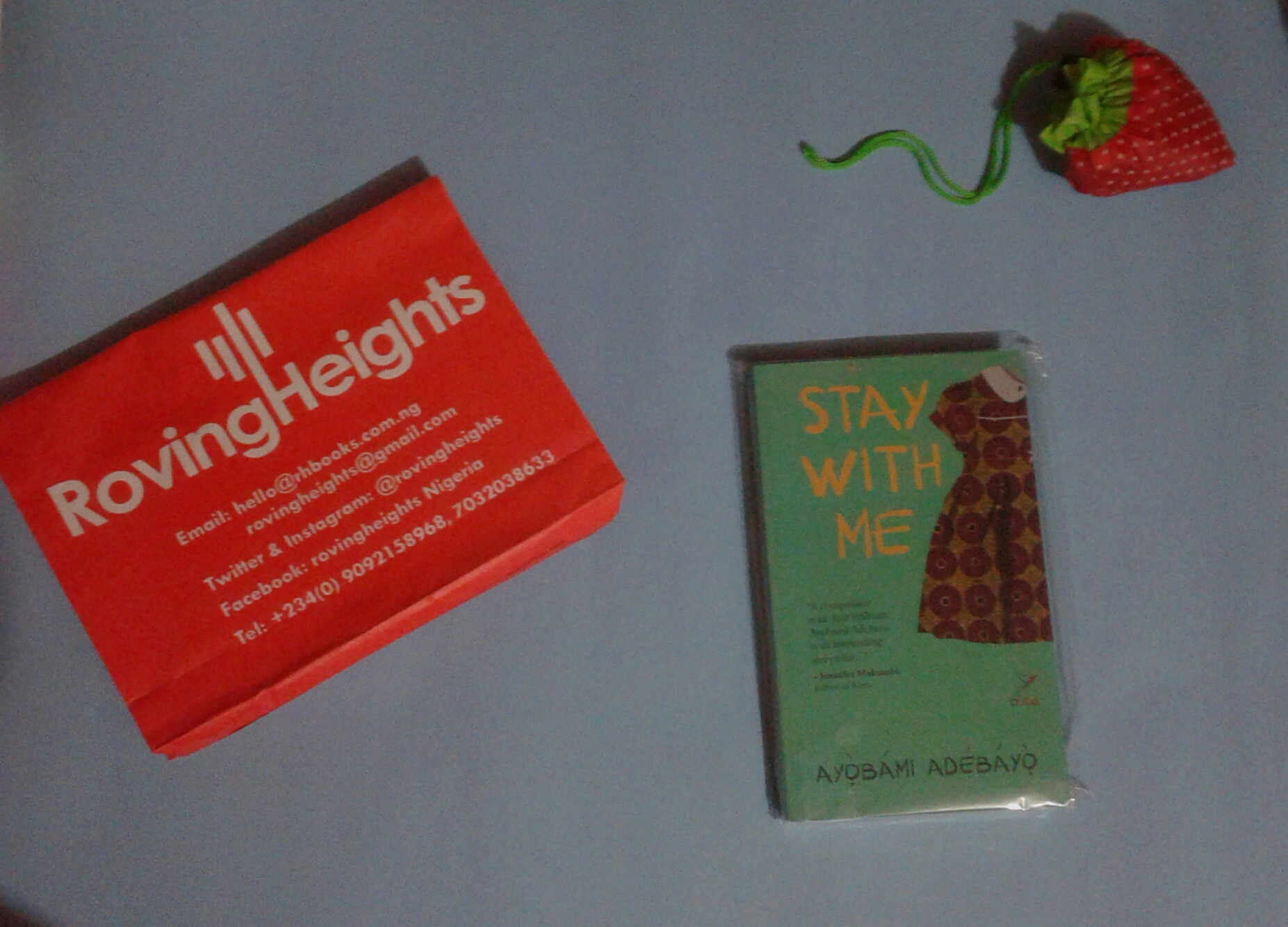
The major themes in this book are captured in the blurb:
“…this is a devastating story of the fragility of married love, the undoing of family,the wretchedness of grief, and the all consuming bond of motherhood”
The story opens up in 2008 and we find a seemingly lonely woman, Yejide, and she directs her thoughts to someone. We’re intruders into this baring of her soul.
It’s direct and we’re not ushered into the book carefully. We must follow on to see who she converses with, in her head.
We’re taken back to 1985 to encounter her life with her husband and how their bliss is often punctuated by the offending relatives who proffer solutions to Yejide’s “barreness“. She often stays on her knees, smiling as they speak, after which she observes the routine of offering them food; their choice often being pounded yam.
Akin, her husband, types away on his phone every time they talk and the illiterate relatives are happy he is paying detailed attention to their words, but what he really does is write his to-do-list for the week.
This scene we’re open to is, however, different. She becomes the first wife, iyale, with hopes that the new wife, Funmi, will give birth and this will usher in the children she needs.
“Our wife, our people say that when a man has a possession and it becomes two, he does not become angry, right?” Baba Lola said.
I nodded and smiled.
“Well our wife, this is your new wife. It is one child that calls another one into this world. Who knows, the king in heaven may answer your prayers because of this wife. Once she gets pregnant and has a child, we are sure you will have one too”
Yejide’s world seems to end.
“I did not feel better. I would not feel better for a very long time. already, I was coming undone, like a hastily tied scarf coming loose, on the ground before the owner is aware of it.”
We are introduced to Akin’s view of her and we see immense love. Similar to Ifemelu and Obinze’s, if you know what I mean. We’re flattered by his love but we’re soon to find out there are things even love, can’t fix.
Life goes on, and all Funmi does, in spite of herself, is to strengthen the bond between the two. We see an example when armed robbers visit their house and leave. Upon hearing a gunshot, Akin made Yejide lie down and stayed atop her and didn’t shift till day break, not even when Funmi asked if he didn’t care about her too. When she cried, he said nothing but went out to check what had happened.
The armed robbers are ushered in, along with developments in the country. We discover the time when estates had no fences and armed robbers began to send letters of intended attacks, and how ridiculous it had appeared at the first. They followed it up with detailed letters adressed to each home; to one, on family planning; to one, of lovers etc, there is dread.
We move into that era where everyone left the radio in their homes on when they went out, to wade off robbers, giving an impression someone is at home.
We’re also nudged into the happenings in the political sector and we live through each coup d’etat that happens. We also experience the anticipation and doubt that follows the announcement of a change from military rule to democracy, the 1993 election, and the pinning after news.
Funmi, is in effect, not the end of their lives.
The book made me appreciate life some years back and the richness of culture at the time. There are a number of Yoruba proverbs and innuendos.
Yejide and Akin try to cope with the expectation of family life. We find out the impact of hate and acceptance from siblings and parents. We understand sacrifices made for family as we’re lead through yoruba folklore stories told to children.
The plot climaxes and the attrocities man is capable of, begins to get revealed, but it is cloaked with good intentions and we observe the “desperate attempts to save ourselves and the people we love from heartbreak” even when it fails.
The book is written in a 1st person POV alternatively between Yejide and Akin. I could follow the common thread of the book easily.
The style is semi-formal. The language is clear and well defined. I particularly enjoyed the way the author weaved her words.
The author, Ayobami Adebayo, has published stories in magazines and anthologies and this book has been shortlisted for bailey’s prize for women’s fiction.
The publisher is Ouida books. It’s been published in the U.k and came out in Nigeria only a week and two days ago . It has 306 pages. I bought it for 3,000 naira having ordered it through roving heights.
ISBN 978-978-959-320-0.
The main characters are Akinyele, Yejide, Yejide’s stepmothers, Dotun, Moomi, iya Bolu. The characters are credible. The characters run into a million problems. Yejide is my favourite character especially her OAU version. Her reasoning is relatable.
I like the book.
I believe everyone who is exposed to adulthood would appreciate this book. I recommend it to those who value family and I rate it 4.5/5stars.
Other excerpts:
On rejection from family:
“Two weeks later, her father died and I was shocked by how her step mothers went out of their way to ensure Yejide stood without any family member at her side. They all moved from one side of the grave to another so that Yejide and I stood alone like outcasts. When I nudged Yejide and asked that we both follow her siblings and step mothers, she smiled and told me they’d moved because of her and if we went to their side, they would simply all move again”
“We can’t keep fighting over this thing, you know. We are brothers, we are blood. A woman can divorce you, family can’t…brother mii, get this right, you can’t fight with me
“
On love:
“I loved Yejide from the very first moment. No doubt about that. But there are things even love can’t do. Before I got married, I believed love could do anything . I learned soon enough that it couldn’t bear the weight of our years without children. If the burden is too much and stays too long, even love bends,cracks, comes close to breaking and even sometimes does break. But even when it is a million pieces around your feet, that doesn’t means it’s no longer love”
”
It was not the outrage in Iya Martha’s scream that stopped my words. It was the tender way Akin’s thumb stroked my Palm. I looked away from his eyes”
On family:
“Every time he married a new wife, my father would tell his children that a family was about having people who would look for you if you got kidnapped. It was a bad joke and I was the only one who ever laughed . I laughed at all his jokes. I think he believed in this myth of his large harmonious family. He probably thought i would still visit my stepmothers after his death.”
“I sat by his bed looking, waiting for the faintest signs that he had decided to return to me. There was no sign. I was afraid to touch him,afraid that my touch might stress him and carry him into the unknown, away from me, forever. By the third day I was on my knees praying to him in muttered words only I could hear saanu mi, malo, omo mi, joo nitori olorun. Saanu mi. Duro timi. Have mercy on me,don’t go please. Stay with me. “
“…and your family, which for a misguided period, I thought was mine”
“I was not strong enough to love when I could loose again”
On having children:
“I never began the story with moomi’s olomo lo l’aye saying. I’d believed her once, I’d accepted it- like the tortoise and his wife- that there was no way to be in the world without offspring. And though I told Rotimi the story many times, I no longer believed that having a child was equal to owning the world”
Debby
What do you think? Have you read this book? Are you interested? The conversation never stops. Don’t forget to share too!

